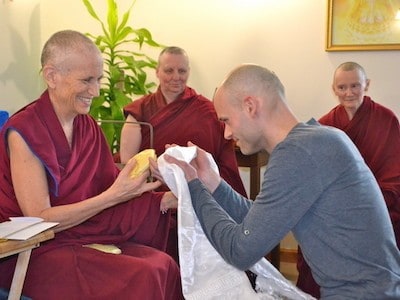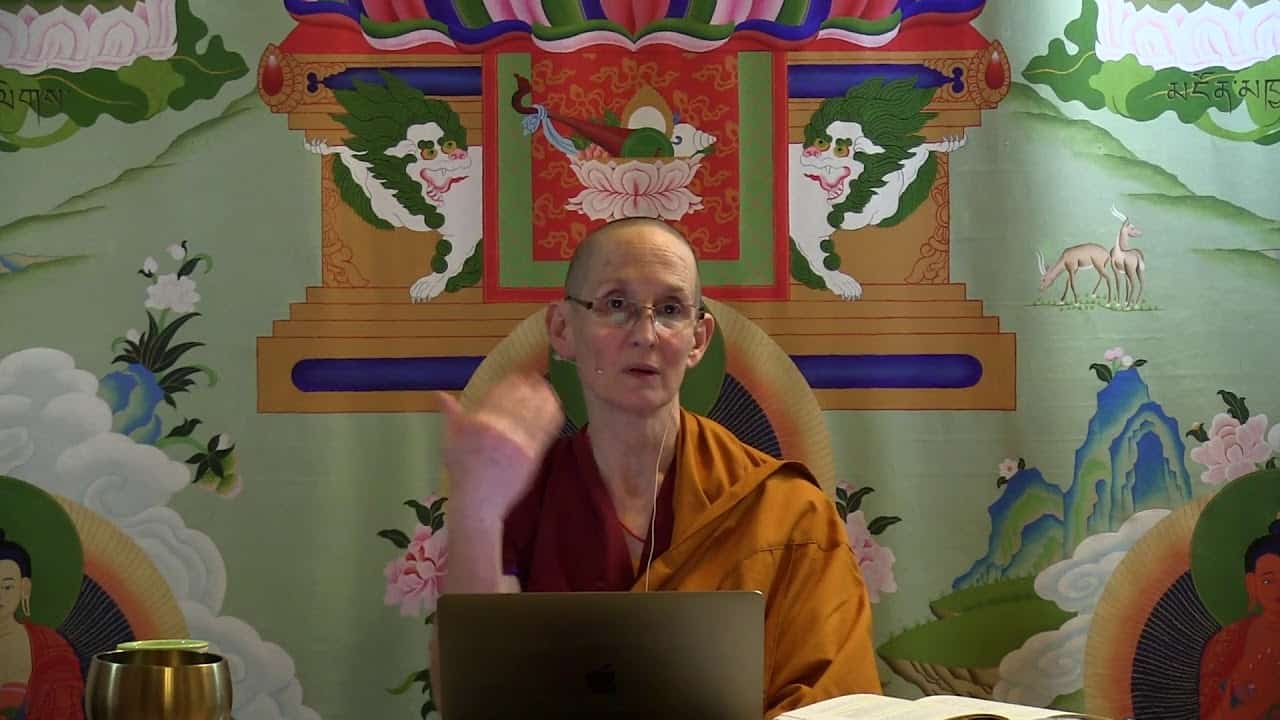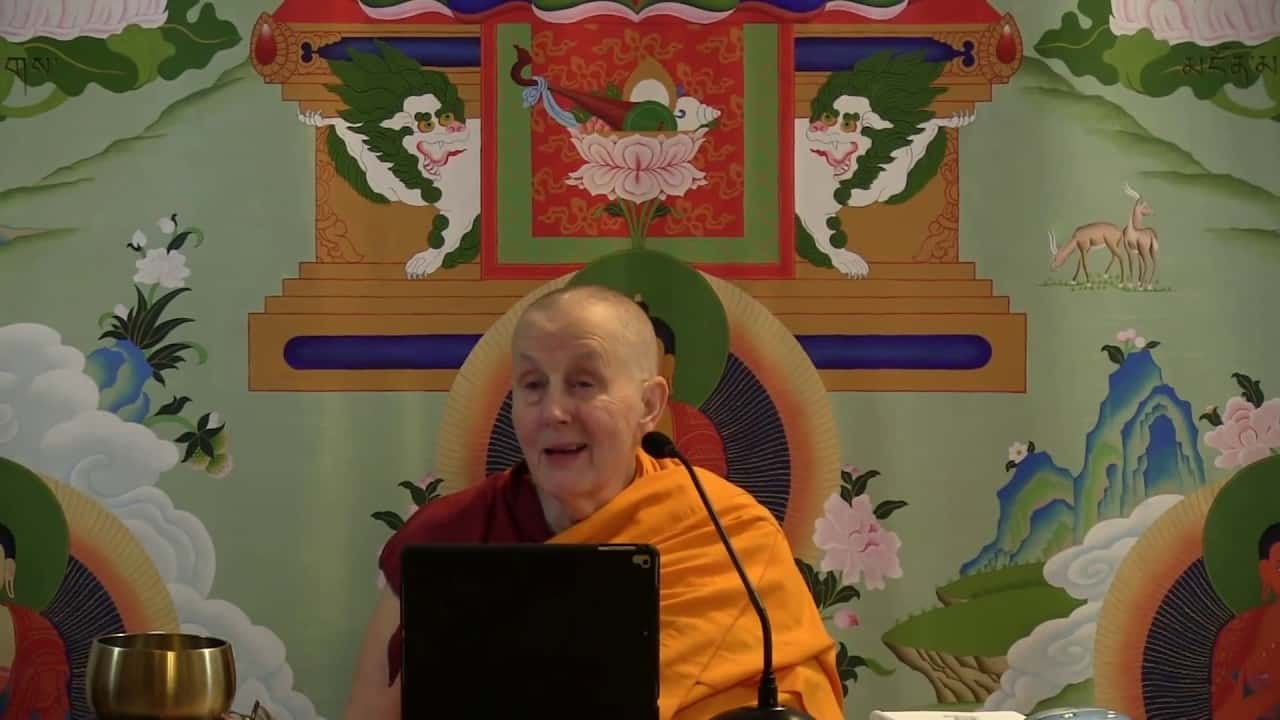Ethical ways to meet our needs
Ethical ways to meet our needs

Our spiritual mentors remind us that we all want happiness and want to avoid suffering. Marshall Rosenberg, the founder of Nonviolent Communication, says something similar. He says every action we do is an attempt to meet a universal human need. The question becomes, how do we help ourselves and others meet these needs while at the same time acting ethically and in accordance with our values?
Back in Atlanta over five years ago, I was desperately trying to meet needs for fun, play, connection, and community. I met these needs, even if only temporarily, by working 50 hours a week, indulging in alcohol and fancy food, and spending my weekends at bars and clubs in pursuit of sexual gratification. However, I began to question these strategies when I met the Dharma.
In 2014, I decided to visit Sravasti Abbey for the first time: to thank Venerable Chodron for her contribution to my wellbeing, to see how monastics live, and to explore new ways of relating to the world. For the next two years, I spent much of my time living and volunteering at the Abbey during increasingly longer stays there. Wanting to remain close to the Abbey while at the same time wanting a greater sense of autonomy, I settled in Spokane and went back to city life.
Without the support of the Abbey’s structure, it was the time to answer my question. What strategies would I choose now? At first, thinking that I could meet all of my needs internally, I focused most of my time on volunteering in the community, but I was mostly alone in my studio apartment. Working four days per week and spending my time alone during my three-day weekends began to contribute to an increasing sense of loneliness and depression. Even while audio-editing Buddhist teachings, I found myself unhappy.
This unhappiness led to an investigation of my needs and the ways in which I might meet them. The strategies that I used in the past were now in conflict with my values and engaging in them would result in breaking my precepts. It was not going to be as easy as reverting to my old ways. I had learned so much about my mind, so with the determination to not fall away from the Dharma, I set out to meet my needs in ways that would align with my present values. I began trying things, seeing what worked and recognizing their effect on my mind.
The understanding that resulted is that while our needs are ethically neutral, our strategies to meet them are sometimes destructive, sometimes neutral, and sometimes virtuous. In addition, some strategies are highly effective, some are somewhat effective and others are not effective at all or in fact counterproductive. So, what are highly effective, virtuous or neutral strategies to meet needs?
Answering this question began with honestly looking at which unethical strategies met which needs. Socializing with friends at the bar met my need for connection and community. Dancing at the club met my need for fun and play. Now, without drinking or pursing a sexual conquest, new strategies were required to meet these needs. Dinner with a friend’s family, lunch with a coworker or speaking honestly in a discussion group fulfilled my desire for connection with others.
While some destructive strategies might be highly effective to meet a need temporarily, it doesn’t mean that they will meet that need long-term. If a strategy meets a need in the short-term, but in the long-term brings the opposite, it would be problematic to put it in the category of being highly effective. Therefore, highly effective and long-lasting must be paired as one category. Mildly effective could be paired with temporarily effective to become temporarily effective. If a strategy brings the opposite result to what you desire, it might be considered counterproductive.
The chart below illustrates these three categories of destructive, neutral and virtuous strategies along with their effectiveness. Strategies to meet the need for connection are inserted into appropriate categories. In general, virtuous activities are the most effective, neutral activities are somewhat effective and destructive strategies are counterproductive in the long-term. The same type of chart could be created for various needs to show what strategies would be worth pursuing.
| NEED: connection | Destructive | Ethically Neutral | Virtuous |
|---|---|---|---|
| Highly effective with long-lasting benefits | Is this possible? | Cultivating a close friendship over years | Cultivating love and compassion |
| Somewhat effective, but temporary | Sexual behavior without commitment | Sharing your feelings with a friend | Dharma discussion group at the Abbey |
| Minimally effective, but counterproductive long-term | Adultery and the resulting breakup | Engaging in social media while alone/td> | Is this possible? |
Effectiveness of a particular strategy can be further subdivided into these two factors: sustainability and reliability. After engaging in the strategy, does the need remain met for a long period of time or, in other words, is it sustained? Does the strategy always work in any situation or is it reliable?
For an example, by engaging in the destructive strategy of cheating on a partner, the need for connection is met at that immediate time. However, the need for connection is not met for very long, so it is not sustainable. The strategy of adultery cannot be done at anytime, and requires particular conditions. Furthermore, if the adultery leads to divorce or to a breakup, which it often does, it actually contributes to the opposite of connection. It is a destructive and counterproductive strategy to meet the need of connection. Sadly and regretfully, I know this from personal experience.
Nowadays, I find myself using the strategy of attending various spiritual groups in the community to help meet my need for connection with others. Certain groups such as an interfaith dance group provides the opportunity to meet many people, hold hands in a circle and hug strangers. While this practice is not specifically Buddhist, it does allow me to connect to others in a meaningful way and prevents me from searching for connection in destructive or unskillful ways. So for this, I am grateful.
Another ethical strategy to meet the need for connection is attending vegan or vegetarian potlucks. These have proven to be a wonderful way to make connections with like-minded people and of course share some great food! I feel good about supporting a community that is dedicated to non-harmful eating.
In the past, I had turned to music for distraction or to fuel my destructive emotional states. Now, I turn to Buddhist chanting or songs with virtuous or positive lyrics when I am wanting to turn my mind towards more beneficial states. This music provides a source of inspiration, joy and hope.
Further along the spectrum from destructive to virtuous is the strategy of cultivating an attitude of love and compassion for others which is highly effective because it is both sustainable and reliable. Once cultivated, love meets the need for connection to others by creating a feeling of connectedness. In addition, love can be cultivated at any time and in any situation, so it is reliable. Generating love is virtuous because it only brings benefits both in the short-term and the long-term.
While I still sometimes engage in destructive strategies to meet my needs, I am recognizing their lack of effectiveness, reliability and sustainability. I am moving towards meeting needs in mostly virtuous or neutral ways by repeating strategies that I find to be highly effective. As I gain greater confidence that I can find wholesome strategies to meet needs, I can at the same time, strive to meet more needs internally through Dharma practice.
Venerable Thubten Ngawang
Originally from Florida, Venerable Thubten Ngawang met the Dharma in 2012 when a friend gave him Venerable Chodron’s book, Open Heart, Clear Mind. After exploring Buddhism online for awhile, he began to attend talks at Drepung Loseling Monastery’s Center for Tibetan Studies in Atlanta, where he took refuge. He first visited the Abbey in 2014 and then spent extensive time here in 2015 and 2016. After about six months of training as an anagarika, he decided to remain as a lay person to reassess his spiritual aspirations and moved to Spokane in early 2017. During his time in Spokane, Ven. Ngawang worked at a non-profit in the affordable housing industry, facilitated classes on Nonviolent Communication at the local prison, and attended the weekly meditation class offered by Abbey monastics at the Unitarian Universalist Church. Coming up to the Abbey frequently to attend retreats and offer service sustained and increased his Dharma practice. In 2020, with the pandemic interrupting many of these activities, Ven. Ngawang moved to Tara’s Refuge, a small house on the Abbey property, to focus more on Dharma. This situation proved very supportive and eventually led to him moving up to the Abbey in the summer of 2021. After reflecting on the distractions of lay life and the disadvantages of following attachment, Ven. Ngawang resumed anagarika training in August, 2021. With more confidence in his ability to work with afflictions, and recognition of his improved ability to live happily in community, he requested ordination ten months later. He was ordained as a sramanera (novice monk) in September 2022. Currently, Ven. Ngawang is a part of the Abbey’s prison program; facilitates SAFE and offering service; supports the grounds team and utilizes his architectural design background where needed.


